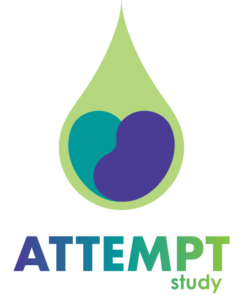Research
EVERYONE Study
![EveryONE Logo [600 dpi] [no background] (2)](https://lab.research.sickkids.ca/mahmud/wp-content/uploads/sites/122/2024/07/EveryONE-Logo-600-dpi-no-background-2-300x177.png)
Empowering diVERse Youth with diabetes thrOugh precisioN mEdicine (EVERYONE)
More information on the EVERYONE Study coming soon.
ATTEMPT Study

Adolescent Type 1 diabetes Treatment with SGLT2i for hyperglycEmia and hyPerfilTration Trial (ATTEMPT)
The ATTEMPT study was an investigator-initiated clinical trial funded by the CIHR-JDRF SPOR Innovative Clinical Trials Platform (iCT). This multi-center study is evaluating a new class of medications called Sodium-Glucose Cotransporter 2 Inhibitors (SGLT2i) on renal function, in this case hyperfiltration, and diabetes control in adolescents between the ages of 12 to 18 years with type 1 diabetes. ATTEMPT was the first study to assess this class of medication in youth with type 1 diabetes, and is currently approved in Canada and the US. The study was conducted over a 3-year period at 3 sites: The Hospital for Sick Children in Toronto, Ontario, Canada; the Children’s Hospital (LHSC) in London, Ontario, Canada; and the Children’s Hospital Colorado in Aurora, Colorado, USA.
Clinical trial information: https://clinicaltrials.gov/ct2/show/NCT04333823
AdDIT Study
Adolescent Diabetes Cardiorenal Intervention Trial
AdDIT is an ongoing multinational evaluation of Cardio-renal complications in youth with Type 1 diabetes that includes observational and interventional drug intervention arms.
The results of the AdDIT intervention study were reported in the New England Journal of Medicine in 2017 (IF=44), and multiple publications related to this trial have been shared in high impact journals.
The results of this study have impacted clinical care and shown use of medications, such as Statins and ACE-inhibitors in high-risk youth with type 1 diabetes is safe and reduces progression of diabetes-related kidney and eye disease.
Clinical trial information: https://www.clinicaltrials.gov/ct2/show/NCT01581476
CD-DIET & CD-LiFE

Celiac Disease and Diabetes Dietary Intervention and Evaluation Trial
(CD-DIET)
This multicenter trial engaged with over 30 diabetes clinics and screened over 2500 adults and children with type 1 diabetes for celiac disease. It also included a randomized dietary intervention study with a multiple outcomes, including impact on diabetes (metabolic) control (published in Diabetes Care 2020), quality of life (Journal of Clinical Endocrinology and Metabolism) and screening outcomes (American Journal of Gastroenterology. Additional manuscripts relating to the dietary outcomes, symptom complex presentation and bone health are underway.
These results have impacted clinical practice such that 1) adults are a high-risk population for celiac disease screening, 2) current screening practices that target symptomatic patients only are inadequate, 3) current screening thresholds we reported need to be used with this clinical population and 4) treatment with a gluten-free diet is associated with worsening of diabetes control and was well tolerated by patients, with no negative impact on wellbeing.
Clinical trial information: https://clinicaltrials.gov/ct2/show/NCT01566110
Celiac Disease and Diabetes Longitudinal Follow-Up Evaluation
(CD-LiFE)
A follow-up study (CD-LiFE) for the interventional study was also established and funded (Physician Services Incorporated, PSI) and will be reporting longer term outcomes from this cohort.
Can-SOLVE CKD Program
Collaboration to Evaluate Youth with Diabetes
As part of the CIHR SPOR funded Can-SOLVE CKD (Chronic Kidney Disease) Program, we have partnered with pediatric and adult investigators to evaluate the progression and impact of complications in youth with type 1 and 2 diabetes. This collaboration allows for the ongoing follow-up of the AdDIT-based cohort into young adulthood and for the evaluation of translational, discovery-based biomarkers to assess risk and progression of diabetes-related complications.
For more information, please visit the Can-SOLVE CKD website: https://cansolveckd.ca/
Social Determinants of Health (SDH) Research

Ongoing Evaluation of Social, Environmental & Socioeconomic Factors that Impact Youth with Diabetes
We have reported through multiple publications on the impact of non-biologic health determinants. These studies through both our research and clinical patient cohorts describe important impacts of circumstance in the health of our youth and we have used these data to help improve our clinical care approaches.





